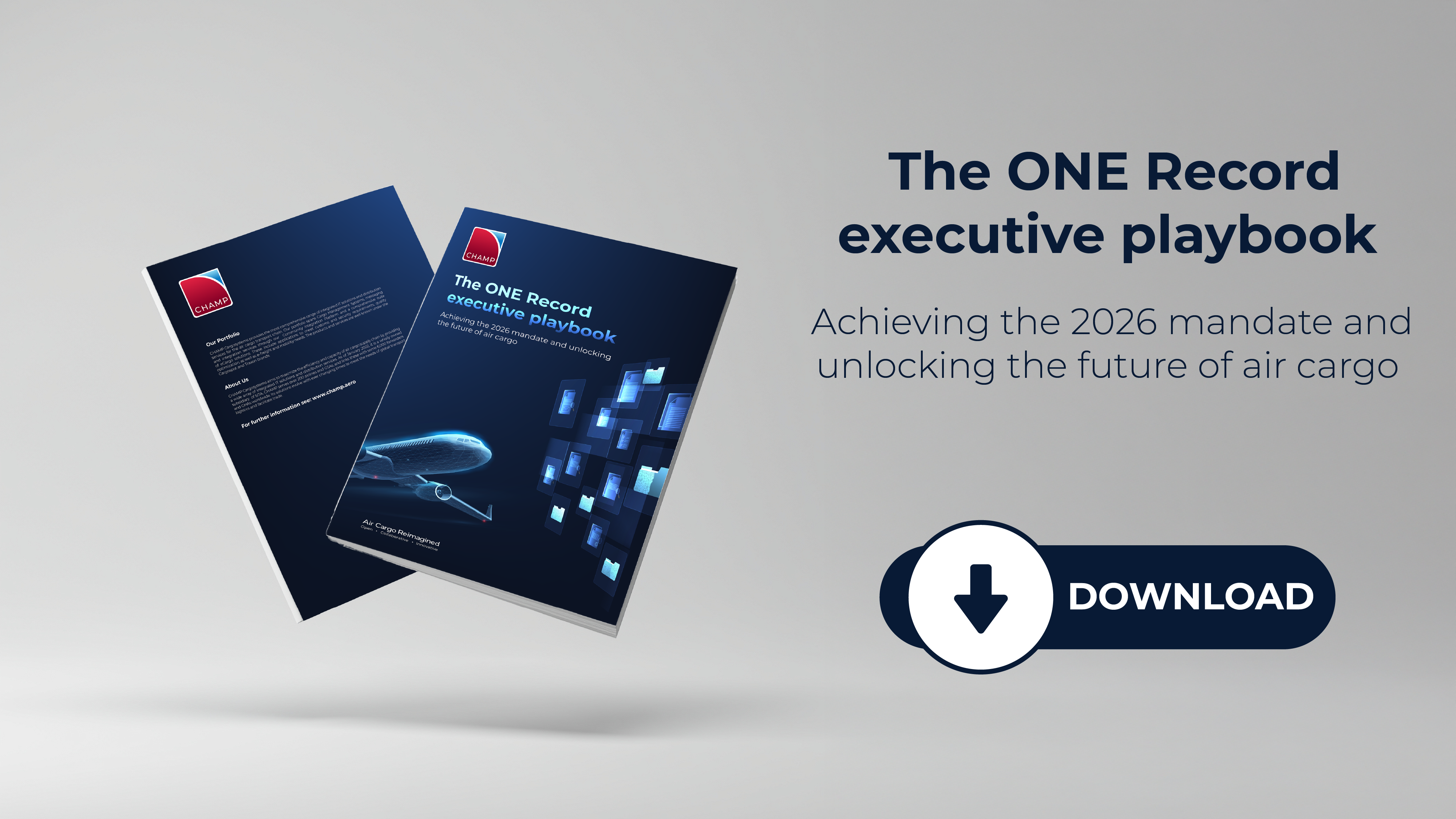Discover learnings taken from CHAMP’s latest sustainability webinar
In this exclusive CHAMP webinar, we had the pleasure of hosting industry experts to talk about Sustainability compliance in air cargo: What’s coming & how to prepare? We explored Sustainable Aviation Fuels (SAF), pathways to achieving “SAF to Net Zero by 2050” and tackling the main ESG challenges organizations face today through sustainability innovations.
Moderated by Bart Jan Haasbeek, Head of Corporate Marketing, PR & Events, CHAMP, industry experts including Chris McDermott, CEO, CHAMP, Marjorie Guerrero, ESG Coordinator & Executive Assistant to the CEO, CHAMP, Glyn Hughes, Director General, The International Air Cargo Association (TIACA), and Arnaud Brolly, Founder & CEO, IMPACT came together for a truly insightful discussion.
We have compiled the key insights and takeaways below (plus a link to watch the webinar back in full).
Tackling organizational ESG challenges
Marjorie Guerrero explained that CHAMP products are contributing to the ERG program of our customers in two main areas, digitalization and operations. While CHAMP has a digital approach across its solutions, one example of a product focused on digitalization is the CHAMP A2Z Scan tool, designed to help the industry move from paper documents to digitized documentation. On the other hand, one product on the operations side of ERG contributions would be Cargospot Weight & Balance, which is set to help airlines with fuel efficiency. Industry initiatives like IATA's ONE Record also help to reduce paper-based documentation and streamline operations.
Marjorie outlined the sustained commitment of CHAMP to address ESG fully via a committee led by our CEO, Chris McDermott. In doing so, we have everything in one area so that we can ensure all the decisions we take are going to be in line with an overall ESG strategy, which is very important for the company’s long-term sustainability and profitability.
The participants then highlighted the barriers to adopting innovative digital solutions for ESG:
- High implementation costs and complexity
- Lack of in-house technical expertise
- Lack of ESG awareness
- Data privacy and security concerns.
The audience was polled, and although individual reasons likely rest on several important factors, most prominently the size of the organization in question, initial results suggested that high implementation costs and complexity are the main concerns for decision-makers when considering ESG and digital solution adoption.
Why sustainability is important for your organization
Glyn Hughes covered the question of why sustainability is important for your organization. The list of factors is always increasing, but despite financial implications, companies are spending more on sustainability.
He said that when considering sustainability strategies, larger companies tend to be further thinking in terms of strategic development. They appoint an ESG coordinator who will develop this, then the organization aligns with it. But even then, sustainability efforts are often driven by necessity rather than proactivity. More specifically, regulatory necessity.
Airlines and airports are the most impacted by (and reactive to) regulations, but Glyn felt that all players across the industry should not wait for regulations to dictate action. Companies should learn to drive sustainability through knowledge and proactivity.
Organizational recommendations:
- Identify what impacts your business
- Educate your company
- Identify ESG champions or coordinators
- Develop a strategy to examine where you need to transform
Environmental impacts and what the future holds
CHAMP CEO, Chris McDermott, shifted the focus to environmental considerations. He stressed the importance of air cargo professionals and organizations prioritizing sustainability, noting that many companies are now appointing dedicated sustainability managers. Taking these steps now is crucial because future customers will increasingly view sustainability as a top factor when choosing business partners.
Chris spotlighted noticeable industry changes due to these forecasts:
- Airlines are buying software to ensure operational efficiencies and handle factors such as fuel and cargo distribution.
- Design of airport infrastructure is now encouraging sustainability and greater operational efficiency.
- Digitalization and Artificial Intelligence (AI) are becoming necessary parts of the air cargo supply chain.
When looking to the future of air cargo, Chris commented:
“Airbus forecasts that by 2044 the number of active aircraft will have doubled, and from a sustainability point of view, if the number of aircraft is doubling just keep level, we'll have to see emissions from those aircraft halve just to remain stable. In the air cargo industry, these forecasts suggest that the number of aircraft freighters will have grown by 50% in that same period.”
SAF: the main lever for decarbonizing aviation
“SAF is expected to contribute by around 65% to the net zero target by 2050.”
Making that point was Arnaud Brolly, while turning attention to aviation sustainability. He also said the aviation sector roughly accounts for around 2-3% of the global CO2 emissions, and air cargo contributes around 15-17%.
His point was that we are moving rapidly from voluntary action to mandatory compliance.
Today, regulation and disclosure requirements are making these actions quite unavoidable:
- CORSIA (Phase two)
- EU ETS (partially expanding to its COPs to include non-EU flights)
- Scope 3 (mandating transparency on indirect travel emissions)
- CRD (corporate sustainability reporting directive from the EU)
- ISSB (International Sustainability Standard Board)
- ICAO (anchoring to and emphasizing the aviation pathway to net zero by 2050)
- Refuel EU - Aviation (increasing SAF blending from 2% today, up to 70% by 2050)
SAF is the main lever for decarbonizing aviation, which can be used in existing aircraft and airport infrastructure to some extent, offering up to 80% lower lifecycle emissions when produced from sustainable feedstock. Yet, the challenge to SAF remains cost.
- SAF is three to five times more expensive than traditional kerosene.
- SAF requires massive investment in production capacity.
As Arnaud pointed out, the aviation sector can follow a path to SAF Certification (SAF-C). SAF-C represents verified CO2 reduction and aims to accelerate SAF adoption, unlock investment, and enable decarbonization. He also said that developing an ecosystem of digital certificate exchange can really turn sustainability requirements into value-creating opportunities for Freight Forwarders, Airlines, and Shippers.
What were the key outcomes of the conversation?
- Cost and complexity associated with adoption are still major hindrances to innovation, but despite that, companies are investing more budget and resources into sustainability.
- However, that push towards sustainability is still largely down to regulatory necessity. That needs to change so the air cargo industry can proactively achieve its sustainability goals, rather than simply comply with the latest requirements.
- Yet, organizations are becoming more serious about placing sustainability at the heart of their practices by appointing ESG coordinators to form sustainability strategies that the wider company can adhere to.
- Strategic innovations, initiatives around AI and Digitalization, and developments such as SAF (& certification) can and are driving the industry to become more operationally efficient and conscious of fuel and energy usage.
- All of these are key blocks to build the foundations for a sustainable future air cargo industry, prepare for what’s next, and attract the customers of tomorrow to ensure continued profitability.
We are grateful to everyone who joined the session. Watch the webinar and download the presentation slides here.
.png?width=72&height=72&name=CHAMP-Logo-RGB-Full-Color-100x100%20(1).png)




